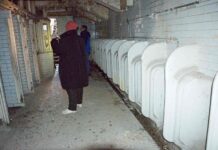By Frances Barrett
Brixton-based charity Eaves is an inspiring organisation doing vital work to help vulnerable women. Frances Barrett talked to them to find out more about the positive impact they’ve had on people’s lives, the closure of their drop-in centre, and how you can help them keep going!

Brixton Road-based Eaves is a charitable organisation doing vital work in a field still largely taboo.
Its vision is a society in which all women are free from violence, exploitation, discrimination and inequality.
Since it was established in 1977, Eaves has undergone an extensive evolution. Initially a housing support service for female victims of violence, it now covers all forms of abuses, including prostitution and sex trafficking.
What makes Eaves unique is a combination of direct frontline services with research and campaign functions.
Heather Harvey, Research and Campaigns Team Manager, told me: “Of course there are other services doing excellent work but usually not all in one place as we do and rarely able to also incorporate research.”
Eaves maintains that having a solid evidence-based and in-depth understanding of issues concerning violence against women and girls (VAWG) is essential in effecting change.
One of its current research projects, in conjunction with London South Bank University, is Breaking the Barriers, which assesses the obstacles faced by women who want to exit prostitution.
Another study examined men in London who buy sex, in order to identify who they buy, why they buy and what might deter them from using women in prostitution.
Heather said: “Our research draws directly on service user experience so that we can then use it to advocate for changes at national, local and individual service provider level which will have a directly beneficial impact on service user experiences.”
The Scarlet Centre, Eaves’ London-based, women-only drop-in advice centre, closed its doors on 31st March after its funding from London Councils was lost.
For the past four years, Scarlet offered a safe space for women who have experienced any form of violence. Heather explained that the centre was a one-stop shop where such women could access counselling, advice and other support and workshops which promoted recovery, self-confidence and independence.
Heather said: “We are confident that we have had a great privilege in being able to work with hundreds of women who have shown great strength and resilience to rebuild their lives after male violence”.
While Scarlet may not have been successful in the new round of bidding for the reduced pot, its legacy will live on in the women it helped, as one service user can testify: “I found my case worker to be a very caring and empathic individual who gave me more information than any other organisation that I have approached for my current circumstances.”
With its other services remaining intact, Eaves will continue to break ground, challenge attitudes and raise awareness of the scale of VAWG, in spite of the cuts.
The Poppy Project, for example, provides support and accommodation for victims of trafficking across the UK. Eaves were in fact the pioneer of the first service for trafficked women and the Poppy Project remains the only service that positions outreach workers in prison and immigration detention centres to identify victims missed by the system.
The Amina Scheme is a peer support service for women who have experienced sexual violence at anytime in their life.
Eaves performs a crucial role and its portfolio of innovative services deserves all the help it can get. Donations from members of the public are welcomed. Find out more information here: http://www.eavesforwomen.org.uk/get-involved/donate-now






